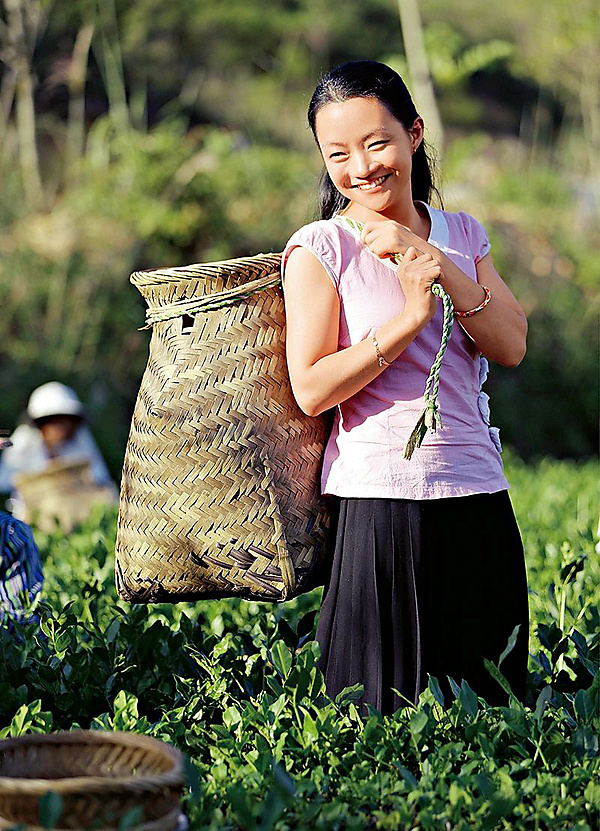Anxi Tieguanyin Tea Culture System, which highlights the planting and development of a semi-fermented, dark-green tea (or oolong tea), known as Tieguanyin, was added to the list of Globally Important Agricultural Heritage Systems Progamme (GIAHS) by the United Nations Food and Agriculture Organization (FAO) in May 2022. In November that year, "traditional tea processing techniques and associated social practices in China" was added to the Representative List of the Intangible Cultural Heritage of Humanity by the United Nations Educational, Scientific and Cultural Organization (UNESCO).
In March 2019, a women's institute was established in Anxi, a county administered by Quanzhou, a city in southeast China's Fujian Province, to inherit Tieguanyin tea culture, and to share that culture with the world. From tea planting and picking to the techniques of making tea, Chinese women have worked hard — through innovation and entrepreneurship — to promote the diverse development of Anxi's tea industry. As such, those women have helped boost the region's rural revitalization.
Tieguanyin tea is like a calling card for Anxi, as the tea has introduced the small county in China to the world. For generations, the environment in Anxi has been favorable to the planting of tea trees, and as such, has fostered the advancement of the tea-making process.
The tea planting and harvesting industry dates back more than 1,000 years in Anxi. A complex agricultural system has been formed in the county, and that system highlights Tieguanyin-tea-cultivation skills, pest- and disease-control methods, ecosystem management of tea gardens, picking and processing of tealeaves, and various related techniques.
In March 2019, the women's federation of Anxi County, in collaboration with Anxi College of Tea Science, under Fujian Agriculture and Forestry University, established the women's institute that focuses on the inheritance and promotion of Anxi Tieguanyin tea culture. He Huanzhu, head of the institute, was one of the experts who participated in the program that resulted in Anxi Tieguanyin Tea Culture System being designated in the list of GIAHS, FAO.
 |
| He Huanzhu, head of the women's institute in Anxi County, Fujian Province, to inherit Tieguanyin tea culture |
He recalls how she realized — while organizing an international meeting on tea culture in 2014 — how hard women worked in China's tea industry, even though they had not received enough recognition for their efforts. She also recalls how she thought, at that time, China needed to cultivate more women masters of tea culture.
During the past six years, the institute has enrolled more than 450 members, has trained and cultivated more than 3,000 new farmers, and has helped 2,000 households utilize the ecosystem while managing their tea gardens. The institute has provided women with opportunities to learn how to manage Tieguanyin tea garden ecosystems, study traditional tea-processing skills, and realize the importance of protecting, inheriting and sharing tea culture, He explains.
Empowering Women to Develop Tea Industry
Development of the global tea industry has provided women in Anxi County with opportunities to become more involved in their region's tea production.
The institute has helped the local women become experienced tea farmers, inheritors of intangible cultural heritage and/or managers of tea enterprises. In turn, the women have increased their families' incomes.
The institute has organized competitions, which cover the whole tea-making process, in 24 towns across Anxi County, He says. While working with Fujian Agriculture and Forestry University, the institute has developed courses in tea-garden management and creative development of tea culture. The courses have been attended by people in China or from abroad.
The institute has helped establish "farm-based schools," "sci-tech or eco-tech-based courtyards" and "women tea masters' workshops." Tourists are welcome to visit tea gardens and learn intangible-cultural-heritage skills, such as tea-making techniques.
Given its efforts to empower women in the development of the local tea industry, the institute has been named a provincial-level Masters' Workshop of Fujian Province, a city-level March 8th Red-Banner Collective and a city-level Model Workers' Workshop of Quanzhou.
Advancing Tieguanyin Tea Culture
The institute has established 20-plus "branch bases," both at home and abroad, so tea masters can study and inherit tea-making techniques, He says. The institute serves as a "bridge" that connects Anxi Tieguanyin tea with other tea cultures throughout the world.
"I hope women tea masters from Anxi will broaden their horizons through communications with masters from around the world. We believe tea culture enriches our beautiful lives. We are looking forward to building a community with a shared future for tea masters and tea lovers," He says.
In 2019, when the institute was founded, He helped arrange for more than 1,000 international friends to visit Anxi to learn about the county's tea culture. "Visitors from around the world studied how we make Tieguanyin tea. They were also fascinated by the history and culture related to the growing of tea in this Chinese county. They had a very nice tour here," He recalls.
It has been said the English word "tea" shares a similar pronunciation with the Fujian dialect of the Chinese word 茶 ("cha," meaning tea). Therefore, people in Fujian Province believe they have a regional connection with tea and they shoulder the responsibility for inheriting and spreading Chinese tea culture.
"We, the women tea masters, are doing our best to combine tea-making techniques with the sharing of stories about the history and customs of our villages. By developing tea tools with creative designs and packages, and by organizing colorful events and tours related to tea culture, we hope more people will become interested in Anxi Tieguanyin tea," He says.
Photos from He Huanzhu and Tuchong
(Women of China English Monthly July 2025)
Editor: Wang Shasha